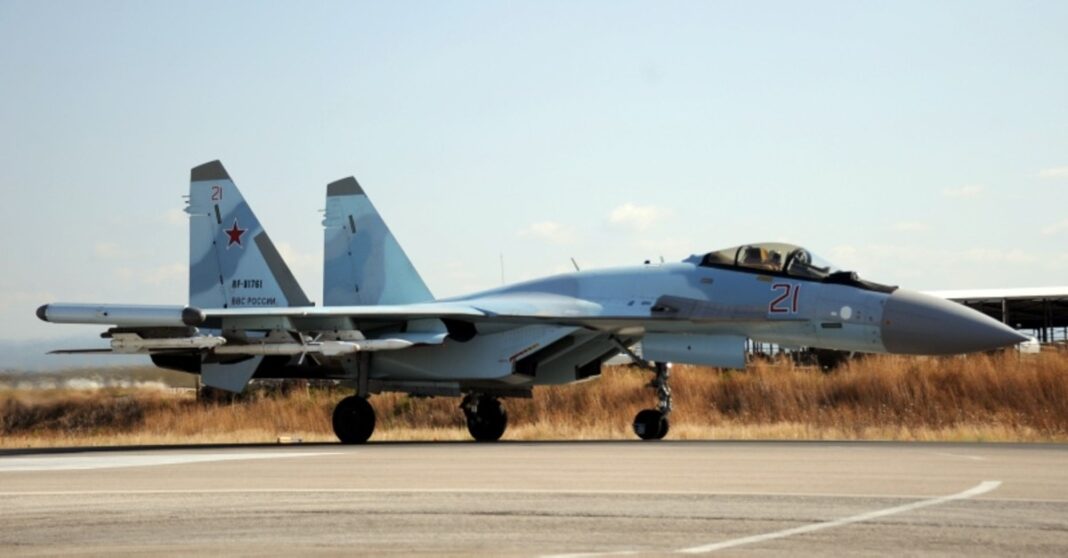‘Long-range Su-35 fighter jets would give the Egyptian army air superiority, which is why the US strongly objected’
Buzz off.
Take a hike. Get lost.
Get stuffed. Beat it. Go to hell.
All well-known expressions, and they roll off the tongue so well. But they all have something in common – a message that says, in no uncertain terms, your contribution is really not needed.
And that is exactly the veiled message Cairo offered to the Pentagon after Egypt received its first order of Russian Sukhoi Su-35 jet fighters.
All brand new and shining in the Egyptian sunlight – take that, IDF. Take that, United States. That, and your threatened sanctions. Go bully someone else.
One could almost hear the wild dog packs of Cairo howling in appreciation.
Major-General Nasr Salem, the former head of the Egyptian army’s reconnaissance department and professor of strategic studies at the Nasser Higher Military Academy, told Al-Monitor that the Egyptian acquisition of the Su-35 fighters (NATO: Flanker-E), along with MiG-29Ms, Rafale fighters and F-16 Falcons, will ensure air control so as to protect Egyptian interests.
“Why doesn’t the US supply Egypt with the F-35 fighters that it supplied Israel with, since it is objecting to the Russian Su-35 fighters deal?” he asked, adding that Egypt’s military seeks to acquire equipment equal to that owned by Israel.
According to Russia’s RT, “Sources indicated that these heavy and long-range fighter jets would give the Egyptian army superiority in the regional sky, which is why the US strongly objected.”
Russia’s Top War website, which focuses on defense affairs, reported on July 23 that the first batch of Su-35 fighters took off from the Komsomolsk-on-Amur Aviation Plant and headed to the European side of Russia, from where they will be delivered to Egypt.
The report read, “Photos of the first five Su-35 fighters built for the Egyptian Air Force appeared on the Web, which made a stopover at Novosibirsk Tolmachevo Airport during a flight to the European part of Russia. As can be seen from the photographs, there are no identification marks on the planes, but the tail numbers on the keels are marked from 9210 to 9214.”
On March 18, 2019, the Egyptian Air Force inked a US$2 billion deal to buy 24 Russian-made Su-35 fighter jets, including related equipment, according to Egypt’s State Information Service (SIS).
An article in the Russian publication Komsomolskaya Pravda also stated that the main reason Egypt insisted on buying the aircraft is that they can outperform the American-made F-15 and F-16 jets — an argument which has some merit.
Major-General Hamdi Bakhit, a member of the parliamentary Defense and National Security Committee, told Al-Monitor that the Sukhoi fighters are a major addition to the Egyptian Air Force in light of the present threats to the region.
Bakhit said the Su-35s are highly maneuverable and multirole fighters that can attack remote ground and air targets, especially heavy concrete fortifications and runways.
They are capable of speeds of 2,800km/h and a range of 4,500 kilometers. Adding external fuel tanks will allow the fighters to travel even greater distance without having to refuel.
According to The Drive, the Su-35 was conceived as the ultimate variant of the big Russian fighter, sometimes referred to as the “Super Flanker.”
It was initially planned for export, however, it is also now in service with the Russian Air Force.
The Su-35 features thrust-vectoring engines and a brand-new mission suite, including a Tikhomirov NIIP N135 Irbis Passive Electronically Scanned Array (PESA) radar and a “glass” cockpit.
Washington has strongly objected to the Russian deal. It added that such a deal would affect future defense deals between Cairo and Washington, Al-Monitor reported.
Bakhit said, “Egypt’s national security is above anything else. If that requires that Egypt acquires the Su-35 fighters, then it should, and is free to decide on the matter. The US has given Israel the newest pieces of its arsenal, which are the F-35 fighters. Thus, the US is using double standards with Egypt when threatening sanctions.”
The message couldn’t be any clearer – they don’t care what the US thinks.













![Hotstar Premium Cookies 2019 [*100% Working & Daily Updated*] Hotstar Premium Cookies 2019 [*100% Working & Daily Updated*]](https://tahav.com/wp-content/uploads/2019/11/Hotstar-Premium-Cookies-Free-100x70.jpg)



